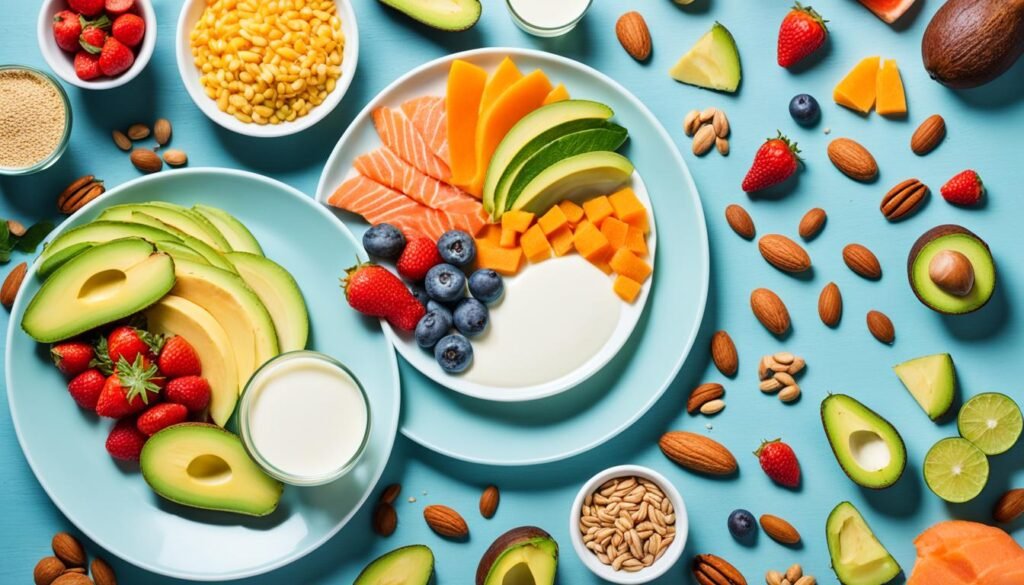Welcome to our guide on how to gain weight in a month! Whether you’re looking to build muscle, recover from an illness, or simply increase your overall body weight, we have you covered. In this article, we will provide you with 10 easy tips to follow that will help you achieve your weight gain goals. These tips are practical, effective, and can be easily incorporated into your daily routine. So let’s get started on your journey to a healthier, more nourished you!
Before we dive into the tips, it’s important to understand the basics of weight gain. By grasping the fundamental concepts behind this process, you’ll be able to make informed decisions and tailor your approach according to your needs. We’ll explore the significance of calorie surplus, macronutrient balance, and the role of metabolism in weight increase. Additionally, we’ll differentiate between healthy weight gain practices and those that should be avoided. Understanding these factors will lay the foundation for a successful weight gain journey.
Key Takeaways:
- Gaining weight in a month is attainable with the right strategies.
- Understanding the basics of weight gain is crucial for making informed decisions.
- Creating a calorie surplus and balancing macronutrients are key factors in healthy weight gain.
- Metabolism plays a role in the body’s ability to gain weight.
- Avoid unhealthy practices and focus on sustainable weight gain.
Understanding the Basics of Weight Gain
When it comes to gaining weight, understanding the basics is essential for achieving your goals effectively and safely. This section will provide you with the fundamental knowledge you need to embark on your weight gain journey. By grasping the concepts of caloric surplus, macronutrient balance, metabolism, and the difference between healthy and unhealthy weight gain practices, you’ll be well-equipped to make informed decisions and optimize your results.
Caloric Surplus and Macronutrient Balance
One of the key factors in weight gain is consuming more calories than your body burns, creating a caloric surplus. This surplus provides your body with the extra energy it needs to support weight gain. However, it’s important to strike a balance in the macronutrients you consume. Macronutrients, which include carbohydrates, proteins, and fats, are the building blocks of a healthy diet. Each macronutrient plays a unique role in your body, and finding the right balance ensures your weight gain journey is both nutritious and effective.
The Role of Metabolism in Weight Increase
Metabolism refers to the processes that occur in your body to convert food into energy. It plays a crucial role in weight gain as a faster metabolism can make it more challenging to put on weight. Understanding your individual metabolic rate can help you adjust your caloric intake accordingly. While some individuals naturally have a higher metabolism, there are ways to boost your metabolism through regular exercise, adequate sleep, and consuming certain foods known to increase metabolism.
Differentiating Healthy Weight Gain from Unhealthy Practices
When aiming to gain weight, it’s essential to focus on healthy practices that promote overall well-being. Healthy weight gain involves nourishing your body with nutrient-dense foods that provide the necessary vitamins, minerals, and antioxidants. It’s about gradually and consistently increasing your caloric intake while prioritizing whole, unprocessed foods. On the other hand, unhealthy weight gain practices may involve excessive consumption of junk food, sugary beverages, and highly processed snacks. These practices can lead to weight gain but come at the expense of your overall health.
Assessing Your Starting Point for Weight Gain
Before embarking on a weight gain journey, it’s essential to assess your starting point. This involves understanding your body’s unique needs and setting realistic goals. By taking these steps, you can develop a sustainable plan that will lead to healthy weight gain.
Calculating Your Daily Caloric Needs
One of the first steps in assessing your starting point is determining your daily caloric needs. This calculation is based on several factors, including age, gender, activity level, and desired weight gain. To estimate your caloric needs, you can use a calorie calculator or consult with a registered dietitian.
Tip: Keep in mind that to gain weight, you must consume more calories than your body burns each day. Aim for a moderate caloric surplus to avoid excessive weight gain or compromising your health.
Setting Realistic Weight Goals
When setting weight gain goals, it’s crucial to be realistic and patient. While it’s possible to gain weight quickly, it’s important to prioritize healthy weight gain. Setting a target weight gain of 1-2 pounds per week is generally considered reasonable and sustainable.
Consider factors such as your overall health, body composition goals, and personal preferences when determining your weight goals. It’s also helpful to break down your goals into smaller milestones, celebrating achievements along the way.
Assessing Your Starting Point for Weight Gain – Summary Table
| Factors | How to Assess |
|---|---|
| Age | Determine your current age. |
| Gender | Identify your gender (male/female/other). |
| Activity Level | Assess how active you are on a daily basis (sedentary/lightly active/moderately active/very active). |
| Desired Weight Gain | Decide how much weight you would like to gain (in pounds or kilograms). |
By assessing your starting point for weight gain, calculating your daily caloric needs, and setting realistic weight goals, you can create an effective and sustainable plan. This foundation will guide you throughout your weight gain journey, ensuring that you achieve your desired results in a healthy and balanced way.
Nutritional Strategies for Weight Gain
In addition to understanding the basics of weight gain, it is crucial to incorporate proper nutritional strategies to achieve healthy weight increase. By focusing on the right foods and meal planning, you can optimize your gains and reach your weight goals effectively.
Foods That Promote Healthy Weight Increase
When it comes to gaining weight, choosing the right foods is essential. Incorporating nutrient-dense options into your diet can help you achieve optimal gains without compromising your health.
Here are some foods that promote healthy weight increase:
- Lean proteins such as chicken breast, turkey, and tofu
- Healthy fats like avocados, nuts, and olive oil
- Complex carbohydrates including whole grains, sweet potatoes, and quinoa
- Fruits and vegetables to provide necessary vitamins and minerals
- Dairy products like milk, yogurt, and cheese for added calories and protein
- Protein-rich snacks such as protein bars and shakes
These foods will not only help you achieve your weight gain goals but also provide essential nutrients for overall health.
Meal Planning for Optimal Gains
Meal planning is a crucial aspect of weight gain. By strategizing your meals and snacks, you can ensure that you are consuming enough calories and nutrients throughout the day.
To plan your meals effectively, consider the following tips:
- Set a calorie goal: Calculate your daily caloric needs and aim for a surplus to promote weight gain.
- Distribute calories throughout the day: Divide your calories into smaller, frequent meals to avoid feeling overly full and to optimize nutrient absorption.
- Incorporate a balance of macronutrients: Ensure that your meals include a combination of proteins, carbohydrates, and fats to support muscle growth and overall health.
- Prep in advance: Plan and prepare your meals in advance to save time and ensure you have calorie-dense options readily available.
- Experiment with recipes: Make your meals enjoyable by trying new recipes and incorporating a variety of flavors and ingredients.
By following these meal planning strategies, you can maximize your weight gain efforts and achieve your desired results.
Nutrient-Dense Foods for Weight Gain
| Food | Calories per Serving | Macronutrients |
|---|---|---|
| Chicken Breast | 165 | Protein |
| Avocado | 234 | Healthy Fats |
| Quinoa | 222 | Complex Carbohydrates |
| Spinach | 23 | Vitamins and Minerals |
| Greek Yogurt | 100 | Protein and Probiotics |
| Almonds | 164 | Healthy Fats |
Meal Timing and Frequency for Gaining Weight

In order to effectively gain weight, it is crucial to pay attention to meal timing and frequency. Gaining weight relies on creating a caloric surplus in your diet, and this can be facilitated by eating frequently throughout the day.
The Importance of Eating Frequently
Eating frequently is essential for weight gain as it helps you consume more calories overall. By spreading out your meals and snacks throughout the day, you can ensure that your body is constantly supplied with nutrients and energy to support weight gain. Meal frequency also helps to prevent prolonged periods of fasting, which can lead to muscle breakdown and hinder weight gain efforts.
Moreover, eating frequently can help to regulate your appetite and prevent excessive hunger. When you go too long without eating, it’s common to experience intense hunger, which may lead to overeating and poor food choices. By eating at regular intervals, you can stay satiated and make healthier food choices, supporting your weight gain goals.
Aligning Meal Times with Natural Hunger Signals
Listening to your body’s natural hunger signals is another important aspect of meal timing for weight gain. It’s best to eat when you are genuinely hungry rather than relying on strict meal schedules or external cues. This means paying attention to your body’s hunger signals and eating when you feel hungry rather than forcing yourself to eat when you’re not.
A great way to align your meal times with natural hunger signals is to practice intuitive eating. This involves tuning into your body’s hunger and fullness cues and eating according to your body’s needs. By doing so, you can maintain a healthy appetite and ensure that you’re eating when your body truly needs nourishment.
Incorporating regular meals and snacks that are balanced with nutrient-dense foods is key for achieving weight gain goals efficiently. Next, we will explore high-calorie options and easy tips to support sustainable weight gain.
High-Calorie Options for Sustainable Weight Gain
If you’re looking to gain weight in a healthy and sustainable way, incorporating high-calorie options into your diet is essential. These calorie-dense foods provide the extra energy your body needs to support weight gain while ensuring you meet your nutritional requirements. By including these options in your daily meals and snacks, you can achieve your weight gain goals effectively.
When selecting high-calorie foods, opt for nutrient-dense choices that offer a balance of macronutrients, vitamins, and minerals. This will not only support weight gain but also promote overall health. Here are some examples of high-calorie options:
- Avocado: Packed with healthy fats, vitamins, and minerals, avocados are a great addition to meals, salads, or smoothies.
- Nuts and nut butter: High in calories and healthy fats, nuts and nut butter can be enjoyed as a snack or added to dishes like oatmeal and yogurt.
- Olive oil: Adding olive oil to your meals increases their calorie content without adding bulk, making it an excellent choice for cooking and dressings.
- Whole grains: Incorporate whole grains like quinoa, brown rice, and whole-wheat bread into your meals to increase calorie intake and provide essential nutrients.
- Full-fat dairy products: Milk, cheese, and yogurt provide a good source of calories, protein, and calcium. Opt for full-fat options for maximum calorie intake.
- Lean meats and poultry: Select lean cuts of meat and poultry to increase protein and calorie intake while minimizing excessive fat.
- Protein shakes and smoothies: Supplement your diet with high-calorie protein shakes and smoothies, which can be made using ingredients like protein powder, fruits, nuts, and nut milk.
Incorporating these high-calorie options into your meals and snacks can provide sustained energy and support healthy weight gain. However, it’s essential to remember that portion control and a well-rounded diet are key to ensure a balanced approach to weight gain. Consult a healthcare professional or registered dietitian for personalized advice and guidance on how to include these foods in your diet to meet your specific weight gain goals.
10 easy tips to gain weight in a month

Gaining weight may seem like a daunting task, but with the right approach, it can be achievable. In this section, we will provide you with 10 easy tips to help you gain weight in a month. By incorporating these tips into your daily routine, you can maximize your calorie intake and support healthy weight gain.
Incorporating ‘Easy-to-Add’ Calories
One of the key aspects of gaining weight is consuming more calories than you burn. To achieve this, consider incorporating ‘easy-to-add’ calories to your meals. This can be as simple as adding healthy fats like avocado or nut butter to your toast, or sprinkling nuts or seeds onto your salads. These small additions can significantly increase your calorie intake without requiring extra effort.
Another easy way to boost your calorie intake is by choosing calorie-dense foods. Opt for foods like whole milk, cheese, and yogurt, as they provide more calories compared to their low-fat counterparts. Additionally, adding healthy condiments such as olive oil or mayonnaise to your meals can also help increase calorie content.
Using Supplements Wisely
Supplements can be a useful addition to your weight gain journey, but it’s important to use them wisely. Before incorporating any supplements into your routine, consult with a healthcare professional or a registered dietitian. They can guide you in choosing appropriate supplements that align with your specific needs.
When it comes to weight gain, protein supplements such as whey protein powder can be beneficial. Protein is essential for muscle growth and repair, which is crucial for healthy weight gain. By adding protein powder to shakes or smoothies, you can easily increase your protein intake and support muscle development.
However, remember that supplements are meant to complement a healthy diet, not replace it. Focus on incorporating nutrient-rich, whole foods into your meals, and use supplements as a convenient way to meet your nutritional needs.
By incorporating easy-to-add calories into your meals and using supplements wisely, you can effectively enhance your calorie intake and support weight gain. Keep in mind that it’s essential to maintain a balanced and nutritious diet throughout the process. With dedication and consistency, you can achieve your weight gain goals.
Effective Workout Routines to Complement Weight Gain
When it comes to gaining weight in a healthy and sustainable manner, a well-rounded fitness routine is just as important as proper nutrition. Incorporating effective workout routines can help you build muscle mass, increase your strength, and support your overall weight gain goals. In this section, we will explore the key elements of an effective workout routine that complements weight gain.
Resistance Training for Muscle Mass
To promote weight gain and build muscle mass, resistance training is a crucial component of your workout routine. Resistance exercises, such as weightlifting or using resistance bands, place stress on your muscles, stimulating them to grow and adapt. This leads to an increase in muscle size and strength, contributing to healthy weight gain.
“Resistance training is essential for effectively increasing muscle mass and promoting weight gain.”
When incorporating resistance training into your workout routine, focus on compound exercises that target multiple muscle groups simultaneously. Examples include squats, deadlifts, bench presses, and overhead presses. Aim to perform these exercises with proper form and gradually increase the weight or resistance over time to continue challenging your muscles.
Balancing Cardio with Strength Workouts
While resistance training is vital for muscle growth, it’s also important to include cardiovascular exercises in your workout routine. Cardio workouts help improve cardiovascular health, burn calories, and enhance overall fitness. However, excessive cardio can impede weight gain by burning more calories than you consume.
To strike a balance between cardio and strength workouts, incorporate cardiovascular exercises such as jogging, cycling, or swimming into your routine, preferably on alternate days or after your strength training sessions. This will help you maintain cardiovascular fitness without compromising your weight gain goals.
It’s important to note that the duration and intensity of cardiovascular exercises may need to be adjusted based on your individual needs and goals. Consult with a fitness professional to tailor a workout routine that suits your specific circumstances.
Staying Hydrated: A Key Factor in Weight Gain
When it comes to weight gain, staying hydrated is often overlooked. Many people focus solely on their diet and exercise regimen without realizing the crucial role that adequate hydration plays in achieving their weight gain goals. Water intake has a direct impact on appetite and can significantly influence digestion and nutrient absorption.
Water Intake and its Effects on Appetite
Did you know that increasing your water intake can actually help regulate your appetite?
When you’re dehydrated, it’s common to mistake thirst for hunger, leading to unnecessary snacking or overeating. By drinking enough water throughout the day, you can differentiate between true hunger and thirst, helping you make healthier and more mindful food choices.
Additionally, water has zero calories, making it an excellent choice for managing your overall calorie intake. By swapping sugary beverages and high-calorie snacks for water, you can reduce your calorie consumption, while simultaneously hydrating your body.
The Role of Fluids in Digestion and Nutrient Absorption
Fluids play a crucial role in digestion and nutrient absorption. They help break down food, allowing your body to extract essential nutrients more efficiently. Without adequate hydration, your digestion can become sluggish, leading to discomfort and decreased nutrient absorption.
By maintaining proper hydration, you can support a healthy digestive system and optimize nutrient absorption. This is especially important when you’re trying to gain weight, as your body needs a steady supply of nutrients to facilitate muscle growth and overall weight gain.
To stay hydrated and support your weight gain journey, it’s recommended to drink at least 8-10 glasses of water per day. However, individual water needs may vary depending on factors such as physical activity level and climate. Remember to listen to your body’s hydration cues and aim for clear, pale urine as a sign of proper hydration.
| Benefits of Staying Hydrated for Weight Gain | Recommended Daily Water Intake |
|---|---|
| Promotes healthy digestion and nutrient absorption | 8-10 glasses of water |
| Helps regulate appetite | |
| Supports overall hydration and well-being |
By prioritizing hydration and incorporating adequate water intake into your weight gain plan, you’ll optimize your body’s ability to absorb nutrients, regulate appetite, and support overall well-being. Don’t overlook this essential element of successful weight gain!
Mental Health and Its Impact on Weight Gain
When it comes to weight gain, it’s not just about what you eat and how much you exercise. Mental health plays a crucial role in determining your body’s ability to gain weight. The impact of stress, emotional well-being, and overall mental health can significantly affect your weight gain journey.
Stress, in particular, can have a profound effect on the body’s ability to gain weight. When you’re stressed, your body releases stress hormones like cortisol, which can increase your appetite and lead to overeating. Additionally, stress can disrupt your sleep patterns, which in turn can affect your metabolism and make it harder for you to gain weight.
Emotional well-being is also closely linked to weight gain. Emotional eating, where individuals turn to food for comfort or as a coping mechanism, can lead to excessive calorie intake and weight gain. Addressing emotional issues and finding healthier ways to manage emotions are essential for maintaining a balanced, sustainable approach to weight gain.
Furthermore, overall mental health plays a significant role in weight gain. Conditions like depression and anxiety can affect appetite, motivation, and self-care, making it difficult to focus on weight gain goals. Seeking appropriate support and treatment for mental health issues is crucial for overall well-being and success in weight gain endeavors.
It’s important to remember that weight gain is not just a physical journey, but a mental and emotional one as well. Taking care of your mental health is paramount in ensuring a healthy and successful weight gain process. Prioritize self-care, seek support when needed, and be patient and kind to yourself throughout your journey.
Monitoring Progress and Adjusting Your Plan
Once you have started your weight gain journey, it’s important to monitor your progress and make adjustments to your plan as needed. Keeping track of your food intake, exercise routine, and overall progress can provide valuable insights into what’s working and what needs to be modified.
Keeping a Food and Exercise Diary
A food and exercise diary can be a powerful tool in monitoring your weight gain journey. By recording what you eat and the exercises you perform, you can gain a better understanding of your calorie intake, macronutrient distribution, and activity levels. This allows you to identify patterns or areas where adjustments may be necessary.
When keeping a food diary, note down everything you consume, including portion sizes and ingredients. This will give you a comprehensive picture of your daily calorie and nutrient intake. You can also use online tracking platforms or mobile apps to simplify the process.
Similarly, maintain an exercise diary to track your workouts. Include the type of exercises, duration, and intensity. This will help you assess your activity level and identify areas for improvement or adjustment in your routine.
Understanding the Need for Patience and Persistence
Gaining weight in a month requires patience and persistence. It’s important to remember that everyone’s body is different, and results may vary. It takes time for your body to adapt to changes in caloric intake and exercise routine.
Having realistic expectations and understanding that weight gain is a gradual process will help you stay motivated and focused. Celebrate small victories along the way and recognize the progress you’re making, even if it’s not always visible on the scale.
Stay committed to your plan and be persistent in following your weight gain strategies. Consistency is key in achieving your goals. Remember that setbacks may happen, but don’t let them discourage you. Learn from setbacks, adjust your plan if necessary, and keep moving forward with determination.
By monitoring your progress, keeping a food and exercise diary, and embracing patience and persistence, you can make informed adjustments to your weight gain plan to ensure continued progress and maximize your results.
| Monitoring Tips: | Adjustment Tips: |
|---|---|
|
|
|
|
|
|
Conclusion
Congratulating yourself on taking the first step towards your weight gain journey is crucial. By following the 10 easy tips provided in this article, you can achieve your goal of gaining weight in a month. Remember, consistency is key.
Understanding the basics of weight gain, assessing your starting point, and implementing nutritional strategies will set a strong foundation for your progress. Don’t forget the importance of meal timing, meal frequency, and incorporating high-calorie options into your diet.
In addition, incorporating effective workout routines, staying hydrated, and considering your mental health will further enhance your weight gain efforts. Monitoring your progress and adjusting your plan as needed will ensure long-term success.
Now that you have acquired valuable knowledge and practical tips, it’s time to take action! Start implementing these strategies today and embark on your weight gain journey with confidence. Remember, gaining weight in a month is attainable with the right approach and commitment.




